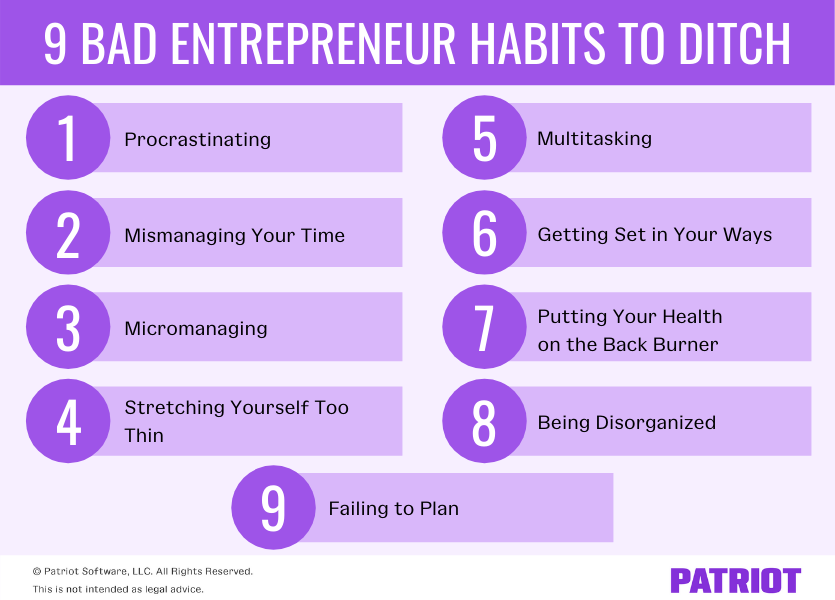New Year’s resolutions are all about cutting out bad habits. Making yourself healthier. Pushing yourself. Bettering yourself. Making yourself happier. But why reserve these types of resolutions for January 1? Why not identify bad habits and cut them out whenever you can?
You can.
And as a business owner, you should quickly identify and cut out bad entrepreneur habits for business growth and development.
9 Entrepreneur habits to ditch
It’s easy to develop bad habits, especially the longer you’ve been doing them. Whether you’re a veteran entrepreneur or are fresh out of the workforce, here are nine common bad business habits to ditch.

1. Procrastinating
You have tasks you know you have to get done. But hey, that’s what tomorrow’s for, right? Maybe … until you realize that all 57 tasks you’ve procrastinated on all need done at the same time.
Some people are more prone to procrastination than others. For example, people who are indecisive, perfectionists, and easily distracted may make procrastination more of a habit than those who aren’t. According to one study, 20% of people chronically procrastinate their responsibilities.
Procrastinating can be a difficult habit to break. But as an entrepreneur, putting things off can lead to more issues for you down the road.
To help you kick a habit of procrastinating into the past, try to improve your time management skills. Which leads us to our next bad habit of…
2. Mismanaging your time
Time management is an important part of being an entrepreneur. You’re juggling a million tasks and trying to grow your business at the same time. And, working long hours might not be a realistic long-term option.
If you’re prone to mismanaging your time, it’s time (no pun intended) to cut out this bad habit…
…Starting with menial tasks. Sure, they may be necessary. But if you’re spending too much time doing things you could be doing faster, you might be mismanaging your time.
Luckily, mismanaging your time is a habit that you might be able to quickly kick to the curb. There are three ways to help you better manage your time as an entrepreneur:
- Delegate tasks to employees
- Take advantage of software (e.g., payroll software)
- Use other tools to streamline tasks
3. Micromanaging
Do you have a bad habit of micromanaging? Whether you micromanage contractors who come over to fix up things in your house or employees at work, you likely know that micromanaging is a trigger word.
In the workplace, nobody wants a micromanager. But, micromanaging is one of the most common bad habits of entrepreneurs. Your business is your baby, so it’s natural that you feel compelled to control every aspect of it.
But if you want to make your employees more engaged, consider cutting out your micromanagement tendencies. Not to mention, micromanaging could become unhealthy for you if you become obsessed with keeping things a certain way.
4. Stretching yourself too thin
Do you make a habit of saying “yes” to everything? How about pushing yourself to your limits to get everything done? As a business owner, you’re probably prone to stretching yourself too thin.
Wearing a million hats naturally comes with the territory of business ownership. When you’re passionate about something, you want to work hard to see it come to fruition. But if you work too hard, you could lose your passion over time and become stagnant.
So, next time you plan on working a 90-hour workweek for the 10th week in a row, take a step back and determine what you need for the long haul.
5. Multitasking
You’re smack in the middle of pulling figures from your financial statements when bam! You get an email that you just have to reply to super quickly. It will take 30 seconds to reply, then you can go back to gathering your data. Innocent enough, right?
Well, not exactly. For many, multitasking is a bad habit that could take up to 40% of your productive time. Having to switch your brain from one task to the other could cause you to lose your train of thought and make mistakes.
And who knows—in our made-up (but totally realistic) scenario of responding to an email and pulling data from your financial statements simultaneously, you might’ve mixed up the information and emailed someone one of your data sets.
6. Getting set in your ways
In life and in business, it’s easy to become set in your ways. The more you start doing things a certain way, the less you take risks. But in business, risk-taking is one of the top things entrepreneurs do for company growth.
There are a number of possible side effects you might experience by getting set in your ways. You might:
- Adapt poorly in new situations
- Be afraid to take risks
- Become inflexible
- Refuse to take others’ advice
7. Putting your health on the back burner
Do you work crazy long hours? Skip meals in favor of eating snack foods on the go? Average four-hour night sleeps?
Your health is your wealth.
Putting your health on the back burner could cost you not just in medical bills but also in productivity. You might think you have no other option but to sacrifice your health for your business. But really, you’ll end up sacrificing both your health and your business.
You can prioritize your health (i.e., good sleep, a healthy diet, exercise, relaxation) and your business’s well-being.
8. Being disorganized
Disorganization is a bad habit that can creep up anywhere. Whether it’s files on your computer or papers in your office, disorganization can lead to poor time management, multitasking, and procrastination (recognize these three bad habits from earlier?).
Getting organized might be time consuming and frustrating, but it can save you overall time and frustration in the future.
9. Failing to plan
Business is all about planning. From business plans to mission and vision statements, you have to think about the big picture for company success.
Failing to plan is a bad habit that goes beyond unpreparedness when it comes to your business. If you fail to make plans, you could wind up boxing your business into stagnation. Cut out this bad habit by doing a little bit of planning day by day.
For example, you could make creating to-do lists part of your entrepreneur daily routine. It’s a simple practice that could become habit, and planning for other situations could then become habits.
This is not intended as legal advice; for more information, please click here.



